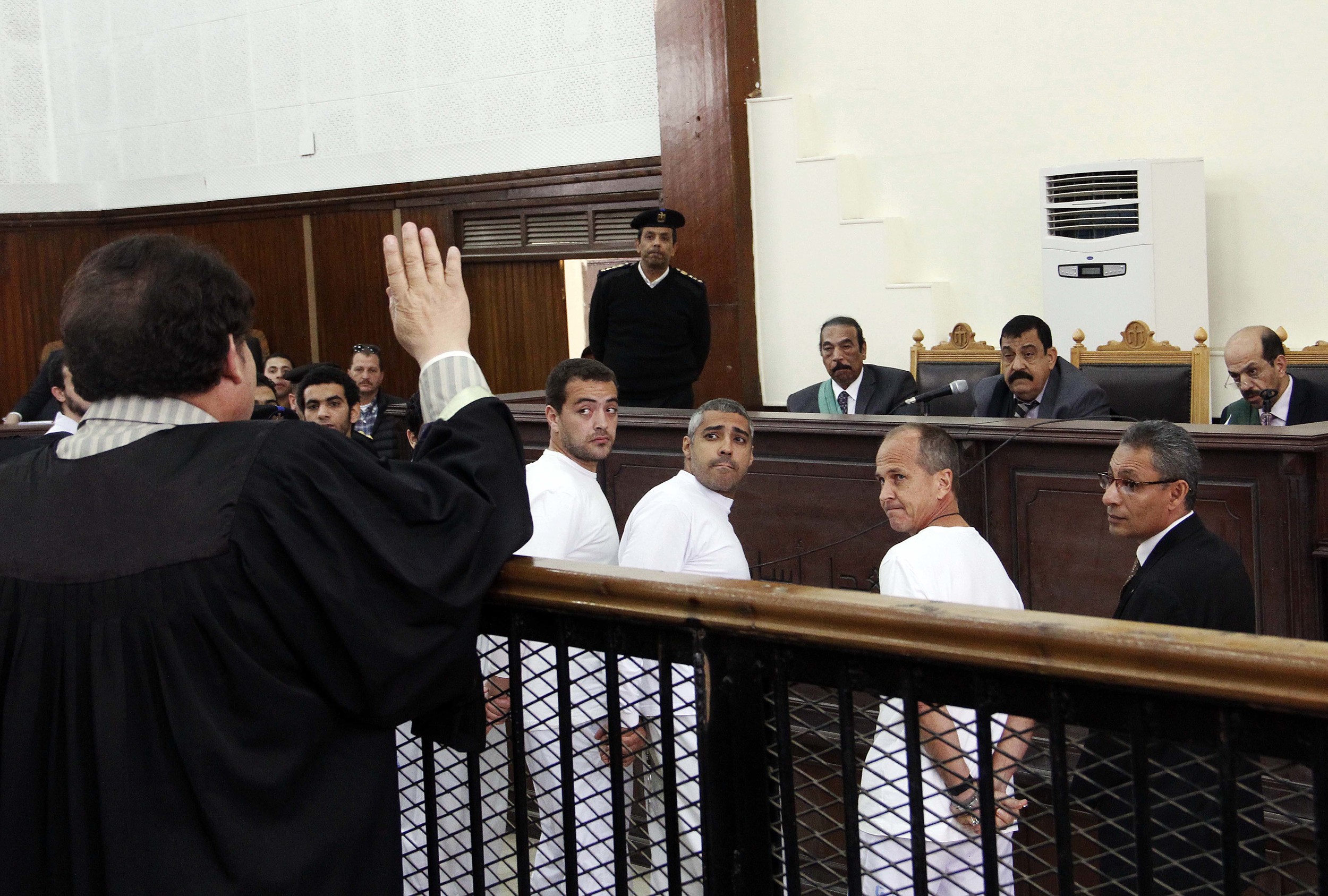Al-Jazeera English Journalists ("Marriott Cell") Case
/The original trial and conviction of three Al-Jazeera English journalists attracted a huge amount of negative news media attention and was hugely damaging to the reputation of the Egyptian judiciary. But, far more important than the proceedings and rulings of the trial court, and what far more accurately reflects the standards of Egyptian justice, is the reasoning behind the subsequent reversal—more like repudiation—of the trial court's rulings on appeal to the Court of Cassation. The following is a summary of the Court of Cassation's reasons for reversal, followed by links to the actual judgment orders of the trial court (in Arabic) and the Court of Cassation (Arabic original and an annotated English translation).
The Trial
The trial and subsequent convictions of three Al-Jazeera English journalists—award-winning Australian Peter Greste, dual Egyptian-Canadian Mohamed Fahmy, and Egyptian Baher Mohamed—involved charges of aiding or being a member of a terrorist group (the Muslim Brotherhood) and harming Egypt’s national interest by broadcasting false news. The convictions and harsh sentences drew an exceptionally high level of sustained international outrage, largely because of reports from trial observers of an almost complete lack of relevant evidence to support the charges, coupled with the bizarrely irrelevant nature of some of the evidence that was produced. For examples, see these news reports from The Guardian: Six Flaws in the Case and Prosecution's Video Evidence.
In the face of international furor over the charges and trial, President Al-Sisi was led to state that he wished the defendants had been deported rather than prosecuted criminally. While resented by many in the judiciary as bordering on interference in judicial decision-making, the fact that President Al-Sisi sent such a clear signal to the judiciary was telling on multiple levels.
The Court of Cassation's Reversal and Reasons
The Court of Cassation found the trial court's procedures and reasoning failed to meet Egyptian standards of justice on multiple levels—so many levels that the Court of Cassation's judgment amounts to an almost total repudiation of the trial and basis for the convictions. By any reasonable analytical standard for making judgments about Egyptian standards of justice and the nature of the Egyptian judiciary, it is the judgment of the supreme court of the nation's criminal justice system that should be given far more weight than the rulings of the trial court whose judgment was overturned.
Beyond its repudiation of the trial court's procedures and faulty reasoning, the Court of Cassation's judgment is also important because the court limited the Penal Code's exceedingly broad definition of terrorism—language with broad potential to be applied to non-violent protest activity—to cases in which convincing evidence is produced of either violence or an intent to commit or aid the perpetration of violence. And, it made clear that the "fruit of the poisonous tree" evidentiary doctrine is applied in Egypt.
The following is a summary of some of the highlights of the Court of Cassation's judgment:
- The court begins the substantive portion of its judgment by summarizing the claims and arguments raised by the defendants’ attorneys.
- The court then summarizes the trial court’s overall factual findings, followed by a lengthy and fairly detailed description of the trial evidence.
- In one of the most legally significant portions of the Court of Cassation’s judgment, the court limits the very broad definition of terrorism in Article 86 of the Penal Code to crimes involving violence in one form or another. The court also describes the two components of the crime that must be proven to sustain a terrorism conviction, the first being the physical acts committed and the second—and most important here—being the requisite criminal intent, including the intent to commit or aid the commission of violence.
- The court held that as a matter of law the trial court failed to cite sufficient evidence to sustain the defendants’ convictions.
- The court pointed out that the trial court stated on one page of its judgment that it relied on the defendants’ alleged confessions in finding them guilty, stated on another page that the defendants all denied those alleged confessions, but failed to state reasons for accepting and relying upon those confessions in the face of the defendants’ denials. The court characterizes the trial court's judgment in that regard as "weak in its reasons" and "severely contradictory," which alone made it necessary to overturn it.
- The court ruled that, after the defendants raised a challenge to the sufficiency of the evidence to support search warrants issued by the Public Prosecution Office, the trial court was required to inquire into and examine that evidence, and to then state cogent reasons in its judgment for any finding of sufficiency. Because the trial court failed to conduct such an inquiry, much less make any findings of sufficiency of the evidence justifying the search warrants, it was improper for the trial court to rely on any evidence obtained from the execution of those search warrants. Once challenged, until proven otherwise such evidence is legally presumed to constitute “fruit from a poisonous tree”.
- The court then returned to the issue of the defendants’ alleged confessions, laid out the standards for determining voluntariness, and described the requirement that any finding of voluntariness by a trial court must be accompanied by a description and analysis of the evidence supporting that finding. In this case, after three defendants claimed that their confessions were coerced, the trial court ordered a forensic medical examination of those defendants to determine whether there was any physical evidence on their bodies of physical coercion, but then “rushed” to rule and convict those defendants without waiting for the results of the court-ordered medical examination, and in so doing impermissibly relied in part on the allegations of their confessions.
- The court held that it was error for the trial court to transfer responsibility to conduct further investigation of the facts back to the Prosecutor General after the Prosecutor General had referred the case to the trial court for trial. The authority of the Public Prosecution Office to conduct further investigation ends when responsibility for the case is transferred (referred) from the Prosecutor General to the trial court. Any supplemental investigation after that referral to the trial court should (and can) be conducted by the trial court. All post-referral evidence submitted by the Public Prosecution Office was legally void, and it was improper for the trial court to rely on that evidence in convicting the defendants.
- The convictions of those defendants who had appeared for trial and appeal were reversed, and the case was remanded for retrial before a different panel of judges.
An annotated English translation of the Court of Cassation's full judgment, as well as the Arabic originals of the trial court and Court of Cassation judgments, are available here.


